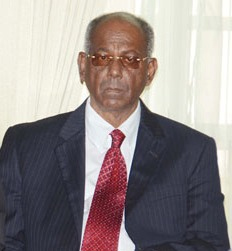Former Speaker of the National Assembly Ralph Ramkarran is calling the attempt by APNU and the AFC to change the composition of the Parliamentary Management Committee (PMC) is a backwards step and is asking for them to reconsider the move since it threatens consensus building.
Writing in the March 24 – 25, 2012 Weekend Mirror, in an article headlined ‘Changing the PMC – A Reckless Pursuit,’ Ramkarran, who served as Speaker for the Eighth and Ninth Parliaments, said that the establishment of the PMC marked an important development of democratic and peaceful political process in Guyana.
“The rejection by the opposition of the PMC as it is presently constituted is a retrograde step and will prove to be a major blunder.

It is not known what the opposition hopes to achieve because the PMC with an opposition majority cannot make a decision that binds the government, if the government chooses to attend meetings which are skewed in favour of the opposition contrary to the spirit which established the PMC and the spirit by which it had operated,” Ramkarran wrote. “The PMC has no authority over the National Assembly or the Office of the Clerk,” he added.
The former speaker pointed out that the opposition has control of the composition of all committees by virtue of its controlling the Committee of Selection except for the Standing Sectoral Commit-tees and the Parliamentary Management Committee, whose composition are specifically provided for in the Standing Orders.
He said that the Standing Sectoral Committees were proposed by the Constitu-tional Reform Commission and subsequently enacted by the Constitutional amendments in 2001/2002. They comprise seven members – four from the Government and three from the Opposition, as provided for by the standing orders. According to Ramkarran, this formulation was based on an agreement between former President and then Leader of the Opposition Desmond Hoyte and then President Bharrat Jagdeo. “It is obvious that the current situation was never contemplated,” Ramkarran said in his article.
However, he said that the PMC “has a completely different genesis and structure.” He said that it was agreed to between Hoyte and then President Janet Jagan in the St. Lucia Statement on July 2, 1998.
“It was then established by resolution No 16 of 2003 and given authority to consider and decide on matters relating to the business of the National Assembly, such other matters which the Committee may wish to consider and such other matters referred to it by the National Assembly,” he said.
Ramkarran said that the resolution establishing the PMC provided for it to have 10 members – five who the government nominates and five from the opposition.
The Speaker of the National Assembly would chair the PMC and would have neither an original nor a casting vote. “The obvious objective was to encourage consensus building and to ensure that one side did not dominate the other,” he said.
The motion that seeks to reduce the membership of the PMC from 10 to 9 is one of three which come up on Budget Day and which aim to amend to Standing Orders, in favour of the opposition majority.
“This would mean that the opposition intends to impose their majority on the PMC contrary to the objective of the St Lucia Statement which agreed to the establishment of the PMC for the better organisation and functioning of the Parliament,” Ramkarran said.
Ramkarran believes that with a majority opposition in the National Assembly, there still can be a role for the PMC. “The PMC can continue to play its role in providing a forum for resolution of differences before they reach the floor of the National Assembly. But it can only do so if it retains its most important feature – equality of representation,” Ramkarran said.
“The impending destruction of the PMC… will send the message to the Government of Guyana that the opposition is not interested in the continuation of [cooperation]. And it will not help the opposition in its parliamentary work… the opposition should reconsider the wisdom of pursuing changes to the structure of the PMC,” said Ramkarran in his article.





